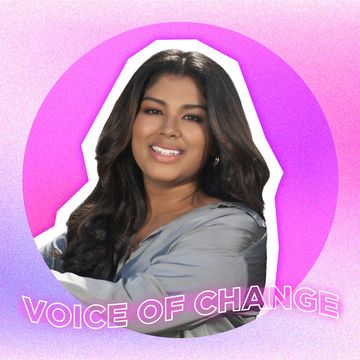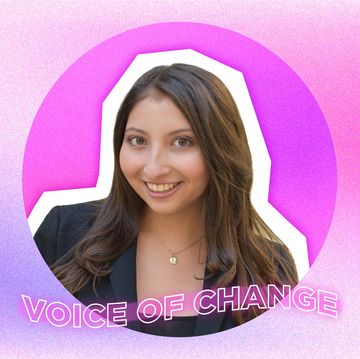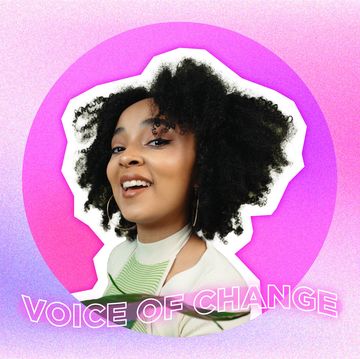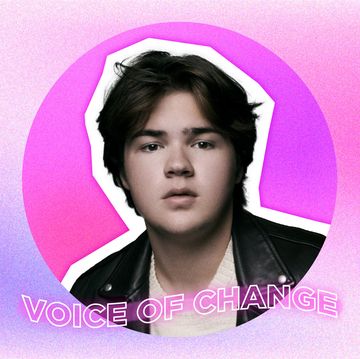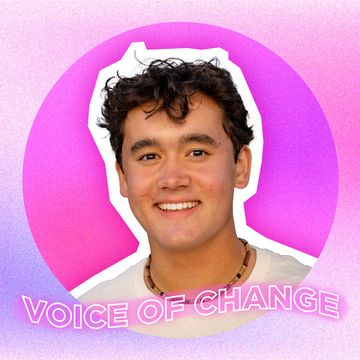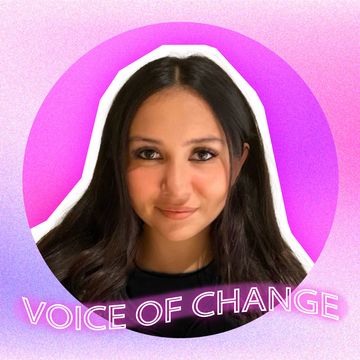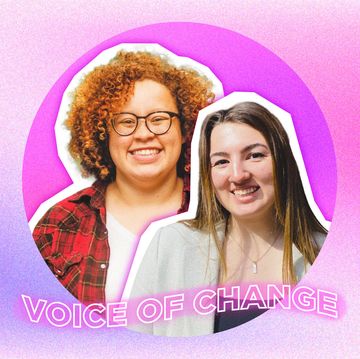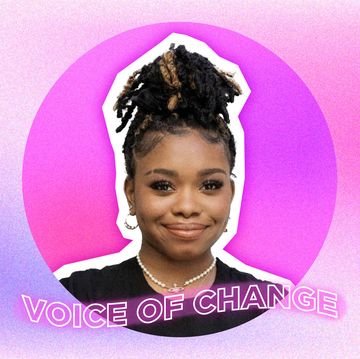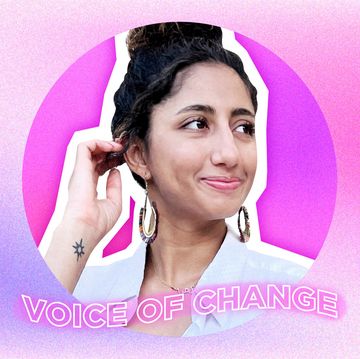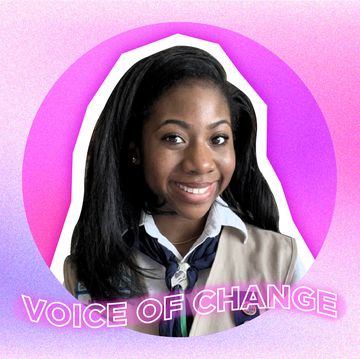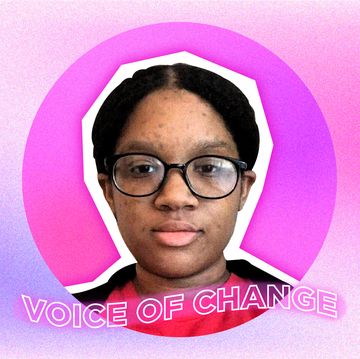Everyone’s journey in environmentalism starts differently, but all stem from an outrage towards climate injustice and a passion to effect change. For Summer Dean, her start in climate action began after she and her family moved from the Pacific Northwest to the coast of Florida, weeks before the 2010 BP Oil Spill killed thousands of marine mammals and wildlife, devastated their habitat, and exposed endangered species to toxic chemicals.
“I’d always felt so close to nature and when I moved to Florida, I fell in love. Then the BP Oil Spill happened, and it was the first time I saw environmental destruction that close up. Ecosystems I felt so close to were completely destroyed,” Summer tells Seventeen. “I saw, firsthand, how fossil fuels not only impact wildlife and the environment, but our lives and communities too. Businesses were affected, people were affected. There wasn’t anything that the pollution didn't touch.”
Summer started writing and talking to her community, trying to find an outlet to process and take action on the anger she felt over one of the biggest environmental disasters in United States history. The first few steps in her advocacy journey were overwhelming. “You don’t know where to start,” she said. But college soon afforded her the opportunity to find her place in the fight against climate change. “When I had the privilege of going to college and studying these structural issues in-depth, I found my voice,” she said.
She created her blog, “Climate Diva,” a platform dedicated to environmentalism and climate solutions, but also a tribute to her love of fashion and drive to bring meaningful change to the industry. “As a woman of color in such a male-dominated scientific field, I often felt like I had to tone down my sense of style and femininity to be taken seriously,” Summer shares. “I didn’t want to hide any parts of myself.” Her platform has since grown to a combined 92.6K followers on Instagram and TikTok, and just this month, she launched her online vintage and secondhand shop, Gaia Vintage. She shares tips on mindful shopping, advice on how to kick your fast-fashion buying habits, information on the latest national climate policies, but above all, she aims to communicate one important message: sustainability is for everyone.
Here, Summer Dean, our latest Seventeen Voice of Change, recounts her sustainability journey and offers tried-and-true wisdom for staying motivated in this fight.
17: How can someone take action right now to be more sustainable?
Summer Dean: If you want to get more involved in your community, there's probably an organization or group that exists in your city. I would look up "climate justice groups in my city" on Google or Facebook. I'm sure you'll find one but if not, talk to your friends and family and people in your community. Get the vibe on how people are feeling about it, and maybe start your own group or club in your school. Talk about these issues and find out ways to take action.
You don't have to be this huge activist or start an organization to take action. Clothing is something that we put on our bodies every single day, so it's an easy place to start. The biggest thing you can do is start being really aware about the clothing you're wearing. Ask yourself, what is my clothing made out of? What are the fabrics? Where was it made? Get a general awareness of that, because I think a lot of people are so busy in their day-to-day lives, we feel a disconnect between ourselves, our clothing, and how it’s made. Choose to be really picky about the clothes you buy. Choose to buy less. Our society is so trend-driven, especially for young people, so don't give into trends that you see on TikTok and Instagram. Try to find your own personal sense of style. That way, you won't be pressured to always buy the newest thing, which I think is really important in terms of reducing our consumption. Try thrifting, buy used things, buy vintage, and learn how to sew.
17: What are some of the long-term actions people can take?
SD: Advocating for policy change is huge. Know who your elected officials are, who your representative is, and get a general awareness of the policies being proposed on environmental issues. For example, in New York right now, there is a huge sustainable fashion bill that is currently being proposed [the Fashion Sustainability and Social Accountability Act]. If passed, it would be one of the biggest sustainable fashion advancements in our country's history. It would basically force all of these major fashion companies — including fast fashion brands — to align their business with the Paris Agreement, and reduce their emissions, think about their supply chains, and pay garment workers a living wage. That's something people can advocate for, for longer-term structural change that would increase the quality of life for garment workers and make our clothing more sustainable. Nothing will ever structurally change until things happen at the policy level.
17: What’s your biggest piece of advice for someone hoping to get more involved in environmental activism?
SD: Keep an open mind. Don't be close-minded on what you think is true or what you think is right, because there are so many different points of view. Sustainability looks different for everyone. Connecting with people in real life is so important, so make friends, talk to people in your community, and hold in-person events, like clothing swaps. Without community, it's hard to build the sustainable future we want.
17: What has been the biggest challenge in your sustainability journey?
SD: When I was in college and doing a lot of activism work, the biggest challenge was feeling like what we were doing was actually making a difference. You see how much needs to change within our society to build a sustainable future, and realize how overwhelming it is. Sometimes, that gets really difficult.
Working in sustainable fashion, I try to make it more appealing than fast fashion and the current fashion model. Fast fashion hides a lot of the ugliness behind the scenes, because on their websites, they make it all look shiny and perfect and chic and affordable, so it's hard to get people to make that switch.
17: What kept you motivated?
SD: One time, I was with a bunch of organizers and we did this exercise where we closed our eyes and imagined what we wanted the future to look like. Using our imagination and picturing what we want a sustainable future to look like helped me because I thought, Oh the things I'm doing right now are helping to build that future. What I want to see is what I'm actively building towards. Even if I think what I'm doing right now isn't having a huge impact, the future I see in my head, that's what I'm actively working on right now.
17: What has been the biggest highlight?
SD: Seeing younger people send messages to say that they've taken action because of me. It always makes me so happy to see that what I'm doing is making a difference. The community I’ve made with my Climate Diva platform has been really beautiful. I feel like I've met people from every single continent and have made so many friends, so that's been really fun, as well.
17: At the end of the day, what do you hope followers take away from your content?
SD: Sustainable and slow fashion can be stylish and just as aesthetically pleasing as fast fashion. And you can start anywhere when it comes to sustainability. Anyone can be a part of the sustainability movement.
17: What does being a Seventeen Voice of Change mean to you?
SD: It means everything to me. It's really exciting. If I were younger seeing this, I would be super excited and happy. When I was younger, I looked up to the people who were in Seventeen, so it's crazy to think about. It's everything to me. I'm very honored.
Leah Campano is an Associate Editor at Seventeen, where she covers pop culture, entertainment news, health, and politics. On the weekends, you can probably find her watching marathons of vintage Real Housewives episodes or searching for New York City’s best almond croissants.



